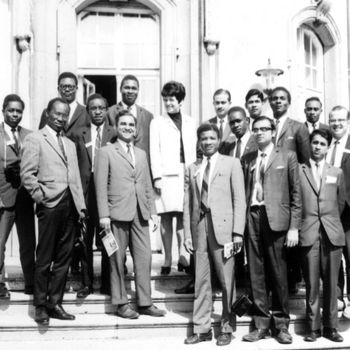Search for academic programs, residence, tours and events and more.
Wilfrid Laurier University celebrates Black History Month and the thriving Black community across our campuses.
Laurier is committed to creating an inclusive, equitable and diverse community and supporting the growth of the thriving Black community across our campuses and locations. As a signatory of the Scarborough Charter on Anti-Black Racism and Black Inclusion, Laurier is redressing anti-Black racism and fostering Black inclusion through principles of Black flourishing, inclusive excellence, mutuality and accountability.
Throughout Black History Month and the rest of the year, we invite you to learn about our inspiring Black student leaders, exceptional faculty, staff members and our impactful alumni who are working to make the world a more just and equitable place through the stories, events and learning opportunities featured here.
Laurier has experts available to comment on Black History Month topics, including history, immigration, culture, spirituality and identity.
The Black Student Association and Black Student Collective are student-led services at Laurier that aim to inform and empower the Black community at our Waterloo and Brantford campuses and Kitchener location.
Follow the Black Student Association and the Black Student Collective on Instagram to learn more about their leadership teams and upcoming events.
This year, as we honour Black history, you can also help to build Black futures.
By making a donation to support the Black Students Bursary at Laurier, you can make a tangible difference in a Black student's educational journey. Your gift will provide vital financial support to Black students across all programs at Laurier who demonstrate financial need.
By contributing to this fund, you are directly helping to remove financial barriers and opening doors to opportunity and success.
Make your donation today, and together, let’s empower the next generation of Black leaders.

Through corporate programs and grassroots movements, Matthew Wright (BA '14) is connecting Black professionals and youth with mentors to inspire excellence.
Wright, a regional manager of business development with American Express, played a key role in the company's Black Employee Network and Inclusion and Diversity Council, where his efforts in an on-campus recruitment strategy have boosted opportunities for BIPOC applicants.

Patricia Dada (MA ’21) is working to address disparities Black individuals face in reproductive healthcare. Through her advocacy, Dada is reshaping conversations around fertility, access to care and the importance of culturally competent support for Black families.
In 2024, Dada was named one of Canada’s Top 100 Black Women to Watch by Canada International Black Women Excellence (CIBWE).

A partnership between Laurier and the Waterloo Region District School Board welcomed more than 200 Black youth to Laurier's Waterloo campus for the Black Brilliance conference. The event aimed at inspiring local Black youth to pursue higher education.
Laurier’s Black Faculty and Staff Caucus aims to engage, empower and protect the interests of Black faculty and staff members while contributing to the capacity and community building necessary for the equitable participation of Black professionals at Laurier. The caucus formed in February 2021 under the guidance of Lamine Diallo, an associate professor in the Leadership program and an equity, diversity and inclusion faculty colleague.
Membership is open to all faculty and staff who self-identify as Black and provides the opportunity to support equity, diversity and inclusion on Laurier’s campuses as it relates to Black experiences.
Black faculty and staff members interested in learning more, getting involved or continuing their involvement can email blackcaucus@wlu.ca for next steps. Together, we can enhance the experiences of all Black faculty and staff and champion the benefits of diversity across Laurier.

Ciann Wilson, an associate professor of Psychology at Laurier, has been named the Canada Research Chair (CRC) in Community-Based Research, Ethics and Well-being in recognition of her impactful research with and alongside equity-deserving communities.
The Canada Research Chair Program is also honouring Wilson with its prestigious Robbins-Ollivier Award for Excellence in Equity.
Using a variety of research methods, including art, digital media and storytelling, Wilson’s research spotlights the lived realities and worldviews of communities to enhance their self-determination and well-being, including disabled, HIV-positive, 2SLGBTQ+, Muslim, precariously housed, substance-using, Black and Indigenous peoples.

Researchers at Laurier’s Tshepo Institute for the Study of Contemporary Africa have been exploring the postsecondary education transitions of African youth with refugee backgrounds. Led by Associate Professors Oliver Masakure and Stacey Wilson-Forsberg, their latest study captured the high school experiences of newcomers in Waterloo, Windsor and Thunder Bay.
Although these young people aspire to pursue post-secondary education, of the 57 youth interviewed for the study, only 12 could describe the steps they were taking to enrol in college or university. Their insights provide a deeper understanding of the hardships experienced by young people from the Horn of Africa, while highlighting their agency and capacity to accomplish educational goals.

Tedla Desta, a former postdoctoral fellow at Laurier who researched the university’s institutional history as part of the Laurier Legacy Project, explores the deep connection between Laurier and the Kitchener-Waterloo region with a focus on the historical contributions of the Black community, which has been present in the area since the early 1800s.
Early Black settlers, including Peter Edward Susand and John Frederick Augustus Sykes Fayette, played key roles in shaping the region’s social and cultural foundations. Desta also addresses the increase in racialized students during the 1950s and 60s, particularly through the International Business Program, while questioning why the university prioritized international students over established local Black communities.

The Tshepo Institute for the Study of Contemporary Africa (TISCA) is a university-wide research centre with active members from multiple faculties involved in Afrocentric research projects.
Founded in 2003 at Laurier's Brantford campus, TISCA aims to provide scholars specializing in Africa with a platform and voice to produce and share timely interdisciplinary knowledge and discourse about issues affecting contemporary Continental Africa and its diaspora.
Laurier is supporting several events to celebrate Black History Month. Events are open to the public unless otherwise noted. Please consult Laurier's event calendar for complete event details.